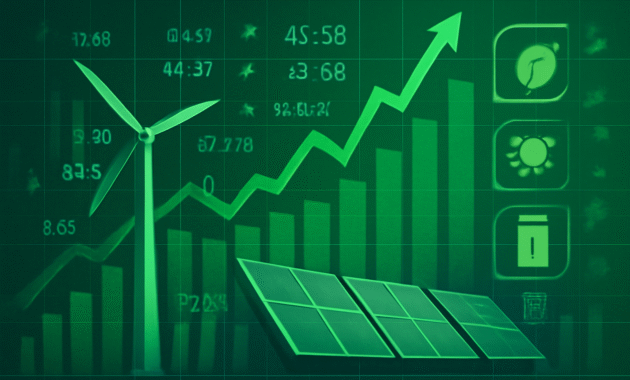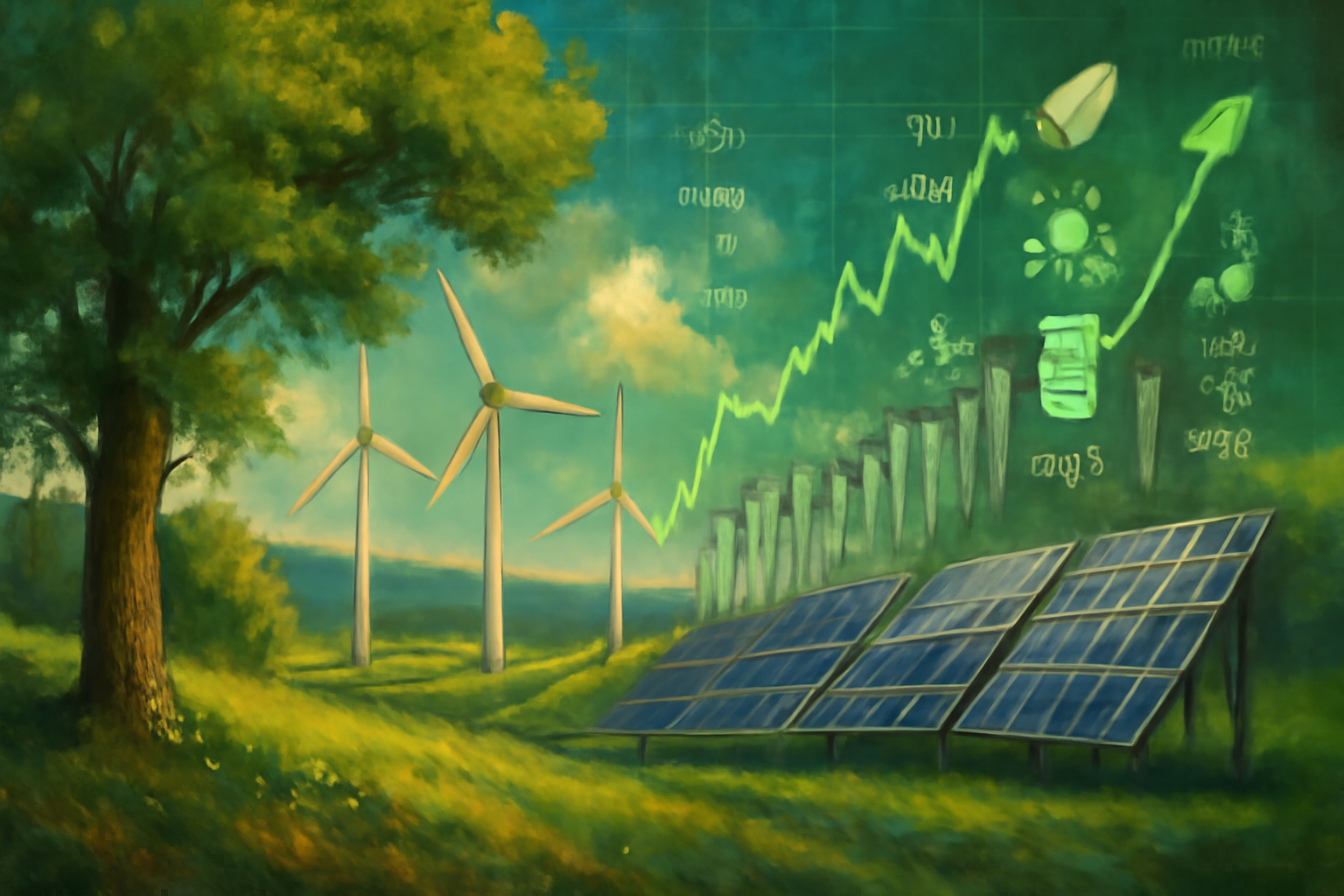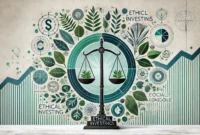The global shift towards sustainability has become undeniable, as businesses, governments, and individuals increasingly focus on green energy and eco-friendly practices.
This trend is reshaping various sectors, with a strong emphasis on renewable energy and sustainability stocks.
Investors are now more attuned to the long-term benefits these sectors offer, not just from an ethical standpoint but also in terms of financial returns.
The need to address climate change, reduce carbon footprints, and embrace cleaner technologies has made sustainability a central focus in both public policy and private enterprise.
In this article, we’ll explore why renewable energy stocks and sustainability stocks represent the future of investing, providing insight into how these sectors are becoming increasingly relevant to investors seeking both profit and a positive environmental impact.
Understanding the Shift Toward Renewable Energy and Sustainability Stocks

The Growing Demand for Clean Energy
The world’s energy demands continue to rise, and so does the need for cleaner, more sustainable solutions.
Fossil fuels, long considered the backbone of global energy production, are rapidly being replaced by renewable energy sources such as solar, wind, and hydroelectric power.
This shift is not just a response to environmental concerns but also a pragmatic approach to securing the future of energy consumption.
As climate change accelerates, governments around the world are introducing policies and incentives to support clean energy, which further drives the demand for sustainable energy.
The renewable energy market is expected to see exponential growth, creating immense opportunities for investors in the coming decades.
Read Now : Top Green Energy Stocks to Watch in 2025 : Market Analysis
The Rise of Sustainability as a Core Value in Investing
Sustainable investing is no longer a niche.
It is now a mainstream practice. Investors are increasingly looking for companies that align with their values, focusing on organizations that prioritize environmental, social, and governance (ESG) criteria.
Sustainability is no longer just an ethical consideration; it has become a key performance indicator that impacts financial outcomes.
Companies committed to sustainability are more likely to have a positive long-term outlook.
They are often more resilient, have a lower risk profile, and attract customers and investors who share their commitment to a cleaner, more responsible future.
As a result, sustainability stocks have become highly attractive to a new generation of investors who care about both profit and the planet.
Key Drivers of the Renewable Energy and Sustainability Investment Boom
The Shift in Consumer Preferences
In recent years, consumer preferences have undergone a significant transformation.
More people are choosing eco-friendly products, sustainable services, and clean energy solutions.
From electric vehicles (EVs) to renewable power sources, consumers are driving demand for green energy solutions.
Companies that are able to meet this growing demand will be positioned to thrive.
By investing in companies that are focused on sustainability and renewable energy, investors can capitalize on the increasing consumer preference for eco-friendly solutions.
Read Now : Investing in Renewable Energy: The Best Stocks for 2025
Government Policies and Incentives
Governments around the world are increasingly prioritizing the transition to clean energy.
International agreements like the Paris Climate Accord have set ambitious goals to reduce greenhouse gas emissions.
Governments are introducing policies and incentives to encourage investment in renewable energy and to accelerate the transition to eco-friendly investments.
For instance, tax credits, subsidies, and grants for renewable energy projects make it more cost-effective for businesses to adopt green energy technologies.
These policies provide long-term stability and financial incentives for investors in the sustainability sector, further enhancing its appeal as a profitable and future-proof investment avenue.
Technological Advancements and Innovations
Technological advancements have made renewable energy more efficient and affordable.
The cost of solar panels, wind turbines, and battery storage systems has fallen dramatically, making it easier for both businesses and consumers to adopt renewable energy solutions.
Innovation is also driving growth in other sectors, such as electric vehicles (EVs) and energy storage.
These technologies not only help reduce carbon footprints but also present significant investment opportunities as the demand for sustainable solutions continues to rise.
Why Renewable Energy and Sustainability Stocks Are Poised for Growth
The Expanding Renewable Energy Market
The renewable energy market is one of the fastest-growing sectors globally.
In 2020 alone, the global investment in renewable energy exceeded $300 billion, with a large portion directed towards wind, solar, and battery storage.
This growth is expected to continue, driven by both consumer demand and governmental policies.
Investors can take advantage of this growth by investing in renewable energy stocks and companies that are at the forefront of the energy transition.
Companies focused on solar power, wind energy, and battery storage are not only contributing to a sustainable future but are also offering investors substantial returns.
Read Now : Top Carbon Capture and Recycling Stocks to Watch Right Now
Risk Mitigation and Long-Term Stability
Unlike traditional energy sectors that are subject to fluctuating oil prices and regulatory changes, renewable energy offers more stable growth prospects.
The shift towards clean energy is a long-term trend, and investors in sustainability stocks can benefit from this stability.
Moreover, companies that focus on sustainability are more likely to avoid regulatory risks and legal liabilities associated with environmental damage, making them more attractive in the long run.
These companies are typically more resilient to market disruptions and are less vulnerable to the risks posed by environmental regulations or fossil fuel price volatility.
The Role of ESG Investing
Environmental, Social, and Governance (ESG) investing has gained significant traction over the past decade.
Investors are increasingly integrating ESG factors into their decision-making process, opting for companies that adhere to higher ethical and sustainability standards.
Investing in sustainability stocks that meet ESG criteria not only supports a positive environmental impact but also offers attractive financial returns.
As more investors prioritize green energy investments, companies that are leaders in sustainability will continue to outperform their peers.
Read Now : EV Stocks Charging Up Investor Portfolios in 2025
How to Get Started with Investing in Renewable Energy and Sustainability Stocks
Research and Select the Right Companies
Before diving into renewable energy stocks, it’s important to do thorough research.
Look for companies that have a proven track record of sustainability, strong financials, and a clear commitment to green initiatives.
Some of the leading companies in the sustainability sector include those focused on solar, wind, and battery technologies, as well as electric vehicles (EVs) and energy storage.
Diversify Your Portfolio
Diversification is key to reducing risk and maximizing returns.
In addition to investing in renewable energy stocks, consider including other sustainable investments such as green bonds, impact funds, and companies with strong ESG practices.
A diversified portfolio ensures that you’re exposed to a range of opportunities within the green energy sector, providing a better chance for consistent returns.
Keep an Eye on Trends and Innovations
The renewable energy market is constantly evolving, and staying informed about the latest trends and technological advancements is crucial.
Regularly monitoring industry reports, market news, and policy updates will help you make informed decisions and capitalize on emerging opportunities in the sustainability space.
Read Now : Why Hydrogen Stocks Are Key to a Sustainable Energy Future
Conclusion
In conclusion, renewable energy stocks and sustainability stocks are not just the future of investing—they are already the present.
The global transition towards clean energy is in full swing, and investors who seize this opportunity will benefit from both positive financial returns and the satisfaction of contributing to a more sustainable future.
By focusing on companies at the forefront of the energy transition, understanding government incentives, and keeping an eye on technological advancements, investors can position themselves for long-term success in the sustainability sector.
The future of investing is green, and it’s time to take action.
FAQ
What are renewable energy stocks?
Renewable energy stocks refer to shares of companies that are involved in the production or development of renewable energy sources such as solar, wind, hydroelectric, and geothermal power.
Why should I invest in sustainability stocks?
Investing in sustainability stocks aligns your investments with environmentally responsible companies that focus on reducing carbon footprints, improving energy efficiency, and adhering to ethical standards, offering long-term financial and environmental benefits.
What is the energy transition?
The energy transition refers to the global shift from fossil fuel-based energy sources to renewable and sustainable energy solutions.
This transition aims to reduce greenhouse gas emissions and combat climate change.
Are green energy investments safe?
While all investments come with some degree of risk, green energy investments have proven to be resilient due to strong consumer demand, government incentives, and long-term growth prospects within the renewable energy market.
How can I get started with sustainable investing?
You can start by researching companies in the renewable energy sector or funds that focus on sustainability.
Look for companies with strong ESG (Environmental, Social, and Governance) practices, and consider diversifying your portfolio with green bonds and impact funds.




